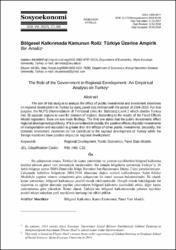| dc.contributor.author | Demirtaş, Gökhan | |
| dc.contributor.author | Aksel, Ebuzer | |
| dc.date.accessioned | 2019-12-05T08:50:51Z | |
| dc.date.available | 2019-12-05T08:50:51Z | |
| dc.date.issued | 30/09/2018 | en_US |
| dc.identifier.citation | Demirtaş, G. & E. Aksel (2018). Bölgesel Kalkınmada Kamunun Rolü: Türkiye Üzerine Ampirik Bir Analiz, Sosyoekonomi, 26(37), 171-184. | en_US |
| dc.identifier.uri | https://doi.org/10.17233/sosyoekonomi.2018.03.09 | |
| dc.identifier.uri | https://doi.org/10.17233/sosyoekonomi.2018.03.09 | |
| dc.identifier.uri | https://hdl.handle.net/11630/7358 | |
| dc.description.abstract | Bu çalışmanın amacı, Türkiye’de kamu yatırımları ve yatırım teşviklerinin bölgesel kalkınma üzerine etkisini panel veri yöntemiyle incelemektir. Bu amaçla bölgelerin ayrımında Türkiye’yi 26 farklı bölgeye ayıran İBBS (İstatistiki Bölge Birimleri Sınıflandırması) Düzey 2’den yararlanılmıştır. Çalışmada belirtilen bölgelerin 2004-2010 dönemine ilişkin verileri kullanılmıştır. Sabit Etkiler Modeliyle yapılan tahmin sonuçlarına göre çalışmanın iki temel sonucu bulunmaktadır. İlk olarak kamu yatırımlarının bölgesel kalkınma üzerinde pozitif etkisi bulunmaktadır. Detaylı olarak bakıldığında ise ulaşım ve eğitim alanında yapılan yatırımların bölgesel kalkınma üzerindeki etkisi, diğer kamu yatırımlarına göre yüksektir. İkinci olarak Türkiye’nin bölgesel kalkınmasında yabancı teşvikler pozitif etkiye sahipken yerli teşviklerin herhangi bir etkisi yoktur. | en_US |
| dc.description.abstract | The aim of this study is to analyze the effect of public investments and investment incentives on regional development in Turkey by using panel data method with the period of 2004-2010. For that purpose, the NUTS (Nomenclature of Territorial Units for Statistics) Level 2 which divides Turkey into 26 separate regions is used for division of regions. According to the results of the Fixed Effects Model regression, there are two main findings. The first one states that the public investments effect regional development positively. If it is considered in details, the positive effects of public investments on transportation and education is greater than the effects of other public investments. Secondly, the domestic investment incentives do not contribute to the regional development of Turkey while the foreign incentives have positive impact on regional development. | en_US |
| dc.language.iso | tur | en_US |
| dc.identifier.doi | 10.17233/sosyoekonomi.2018.03.09 | en_US |
| dc.rights | info:eu-repo/semantics/openAccess | en_US |
| dc.subject | Bölgesel Kalkınma | en_US |
| dc.subject | Kamu Ekonomisi | en_US |
| dc.subject | Panel Veri Modeli | en_US |
| dc.subject | Regional Development | en_US |
| dc.subject | Public Economics | en_US |
| dc.subject | Panel Data Models | en_US |
| dc.title | Bölgesel Kalkınmada Kamunun Rolü: Türkiye Üzerine Ampirik Bir Analiz | en_US |
| dc.title.alternative | The Role of the Government in Regional Development: An Empirical Analysis on Turkey | en_US |
| dc.type | article | en_US |
| dc.relation.journal | Sosyoekonomi | en_US |
| dc.department | İktisadi ve İdari Bil. Fak. | en_US |
| dc.authorid | 0000-0002-6757-5613 | en_US |
| dc.identifier.volume | 26 | en_US |
| dc.identifier.startpage | 171 | en_US |
| dc.identifier.endpage | 184 | en_US |
| dc.identifier.issue | 37 | en_US |
| dc.relation.publicationcategory | Makale - Uluslararası Hakemli Dergi - Kurum Öğretim Elemanı | en_US |
| dc.contributor.institutionauthor | Demirtaş, Gökhan | |



















